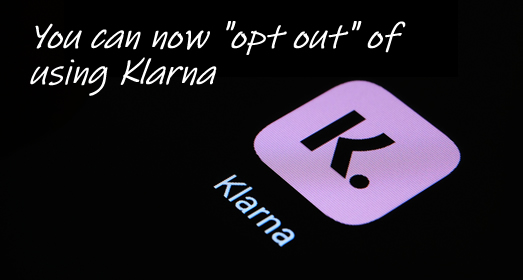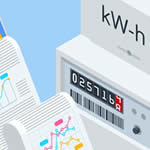
On 24 May 2023, Klarna introduced a new feature that allows a customer to “opt out” of future credit.
This covers Klarna Pay in 30, Pay in 3 and their longer-term Klarna Financing credit.
Why is this needed?
Many people find Klarna just too easy to use too often. Spreading payments with no interest being added sounds so sensible, but it still means that you have less money next month because of the repayments. So you may use BNPL again, as a way to get through the next month.
Used once, it is a convenience. Used regularly, many find it is a trap that it’s not easy to escape from. And when they have paid off the Klarna purchases, they may want to remove the temptation to use Klarna again.
Before this new opt out, if you want to stop using Klarna and close your account, you had to talk to Klarna’s customer services.
Making this easier is a good idea and this new opt out will help
It won’t help if you can’t afford to make your current Klarna repayments – then you need to talk to Klarna about an affordable repayment plan or talk to a debt adviser
How Klarna’s opt out will work
The settings tab in the latest version of Klarna app now has an option to deactivate credit. After your account has been deactivated, you will be taken to a page about financial support. This may be of help if you have debt problems.
This opt out will not stop Klarna sending you marketing emails – you have to unsubscribe from those separately. Klarna says they may in future make unsubscribing automatic for people who are opting out – I think they ought to!
If you change your mind and want to start using Klarna again, you will have to talk to Klarna’s customer services and they will reactivate the account.
Should other lenders offer this?
Klarna has called for credit cards such as Barclaycard and Amex to provide a similar facility.
And they may well do… not because of Klarna’s lead, but because on 31 July 2023, the Financial Conduct Authority’s new Consumer Duty comes into force. This requires FCA-authorised lenders to:
enable and support retail customers to pursue their financial objectives.
“Sludge” and the new FCA Consumer Duty
The FCA has given examples of poor practice that will not be consistent with the new Consumer Duty. One of these is “sludge”:
there can be commercial incentives for firms to create friction points (often called ‘sludge’) that deter their customers from taking action in their interests, such as making a complaint or switching product or provider
Allowing an account to be opened easily online, but then requiring a customer who wants to close it to speak to Customer Services is an illustration of sludge.
The new Consumer Duty won’t apply to BNPL lenders this summer, as they aren’t yet FCA-authorised, see below.
But Klarna’s introduction of this “opt out” is an example of the sort of change that many lenders will currently be looking at introducing.
BNPL regulation making progress in the UK, but slowly
This week it has been announced that Australia will be introducing BNPL regulation by the end of 2023. The Australian Finance Minister said:
“BNPL looks like credit, it acts like credit, it carries the risks of credit.”
In the UK, progress is being made, but it’s slow. In February 2023 the Treasury published its proposed draft legislation. The consultation on this closed in April and the government hopes to bring in the legislation this year.
After that legislation, the FCA will be able to regulate BNPL lenders and it will bring in new rules for this sector. So perhaps in 2024?
Update – progress on regulation seems to have halted in summer 2023 … see 27% of adults use Klarna or other BNPL – regulation is needed for details.



Jon says
Best thing to do is to dump credit cards/ companies altogether,Their motto is the same as banks how much interest can we get away with and for how long.This is how sub prime lending almost caused the banking collapse.Klarna are the same just a bunch of parasites.
Nicola says
Hi Sara ! I’m looking for advice for my partner ! He has used Klarna a few times over the last few years and used it quite a lot one month ! He is aware they report to credit reference agencies now but recently looked at his report and it says he has 32 credit account applications ! This has made his score drop dramatically ! He has always paid on time and has since paid all the payments and has not used it since ! It just seems weird they report each purchase as an account ! Is this right ?! And when do they get marked as closed if they are now paid ?!
Sara (Debt Camel) says
Each purchase is a separate account – they should be marked as closed the month after they have been paid.
But these should not affect his credit score.